|
A physical security audit is a comprehensive assessment of your fleet's truck and trailer locks. Typically, this assessment measures current physical security selections against the industry best practices and standards.
Why are security audits important? Security audits help organizations assess and mitigate potential risks. By pinpointing vulnerabilities and weaknesses, organizations can take steps to strengthen their security measures. Additionally, physical security audits can help to: Protect your reputation: Supply chain disruptions can damage a brand's reputation for reliability. Companies may opt to cancel other deliveries, end the relationship, and search for a more security-conscious fleet. Reduce losses due to pilferage and theft: Regular physical security audits can be more cost-effective than dealing with the aftermath of a cargo theft. The costs associated with a theft can include the value of the cargo, increased insurance premiums, cargo recovery efforts, cost of supply chain interruption and more. Gain additional lanes of freight: Use of high security locks can earn fleets more lanes of freight carrying higher value loads. PHSYSICAL SECURITY ASSESSMENT FOR TRUCKS AND TRAILERS
If you answered “no" to any of the risk assessment questions above, please contact us at Transport Security and we can make security recommendations for your fleet. Conducting regular physical security audits allows organizations to promptly detect and resolve new vulnerabilities. Upon completion, teams can rest assured knowing that the necessary security protocols are in position to mitigate potential risks.
0 Comments
Cargo thieves are always searching for their next target. They are looking for what they can easily get and sell quickly. Fleets can help take the target off their trucks by being security minded and knowledgeable about commodities and locations thieves are attacking. Your answers to the following questions can help you determine the threat level your fleet may be at for targeted theft. Do you have good in-transit security? Your fleet may be a target if your trailers are not locked or are only secured with a plastic seal. Thieves survey gas stations, truck stops, warehouses, etc looking for weak security that they may quickly bypass. The ENFORCER® line of products are heavy duty and provide effective protection against forcing, drilling, picking and vandalism. Trailer door options for good in-transit security include the Adjustable Door Lock or the hasp and padlock assembly. Both of these security devices include ABLOY® padlocks with case hardened boron steel shackles. Do you pick up containers from ports or rail yards? Increases in theft activity around major intermodal hubs were significant in 2022. Idle container shipments are far easier for criminals to pilferage then one in motion. Ports in California, Texas, Florida, New Jersey and Georgia are current hot spots for theft. According to CargoNet data, “Theft in Georgia increased by 34% year-over-year, due in part to organized crime groups that took advantage of increased traffic to the Port of Savannah. Georgia shut down a state task force to investigate cargo theft in 2020.” Illinois and Memphis have rail yards that have also been targeted by thieves in recent years. Does your fleet drive through high theft states? “California remained the top state for reported events in 2022 and theft in the state increased 41% year-over-year,” according to CargoNet’s 2022 Supply Chain Risk Trends Analysis. Theft around Los Angeles and the Inland Empire is well documented and fleets traveling through this area should remain especially vigilant. Texas and Florida were the second and third most targeted states for cargo theft last year. Are you hauling targeted commodities? Evaluate what kind of commodities you’re hauling and whether or not they match current cargo theft trends. “Household items were the most stolen commodity in 2022. This is a diverse category that includes appliances and furniture which often get targeted during long haul and final mile distribution. Household items were closely followed by electronics. Additionally, theft of televisions and other displays nearly doubled from 2021,” CargoNet reported. Theft of food and beverage products also grew due to supply chain and scarcity issues. Food and beverage products are difficult to trace and are easy to sell, making these items very attractive to thieves. Fleets utilizing seals to ensure tampering has not occurred should strongly consider the ENFORCER Seal Guard Lock which protects the seal and secures the swing doors. Do you have layered security in place at your warehouse/distribution center? Oftentimes cargo thieves have the ability to survey a property undetected. They learn schedules and patterns of the fleet and look for weaknesses they can take advantage of. Good lighting and fencing can help protect your equipment and cargo. Secure dropped trailers with a heavy duty King Pin Lock and a Landing Gear Lock. Also, have drivers ready to go when they pick up a load. Drivers should be prepared to drive 200 to 250 miles right after loading to get out of the “red zone” where cargo thieves like to hit. Cargo theft can occur at any time. Keeping your answers to these questions top of mind when reviewing security plans and protocols can help keep your fleet stay secure on the road. Cargo theft bounced from “High” to “Extreme” on CargoNet’s Cargo Theft Threat Level indicator at the end of 2022. So far in 2023 it has stayed in the “High” or “Extreme” category. What’s driving the surge in cargo theft? Holidays: The end of year holidays are traditionally a time cargo thieves strike. More freight tends to be moving and in-demand gifts are targeted. Trucks are often left unattended during the holiday season and warehouses/distribution centers are closed or running on shortened hours, allowing thieves additional time to steal or pilferage. Scarcity and Cost Driving Illicit Market Demand: Many consumer items have become hard to get or their cost has risen substantially due to inflation. Cargo thieves target these types of items knowing there is a market for a quick sale after the theft has occurred. Currently we are seeing this happen to higher cost food items such as meat as well as electronics including computer graphics cards. Fleets and Drivers Without a Plan: Benjamin Franklin's quote: “By failing to plan, you are preparing to fail” is accurate in the security industry. Those without a layered security plan in place to prevent theft may find themselves scrambling after an event occurs. Plan ahead by making sure parking for trips is secured and layers of security are in place to protect the equipment and load. Theft Activity at Major Intermodal Hubs: According to CargoNet’s 2022 Supply Chain Risk Trends Analysis, “California remained the top state for reported events in 2022 and theft in the state increased 41% year-over-year. Computer and green energy components were some of the most frequently stolen items of the year and California is a major logistics hub for these items. Theft in Georgia increased by 34% year-over-year, due in part to organized crime groups that took advantage of increased traffic to the Port of Savannah.” Shrinkage in Cargo Theft Task Forces: Many states have reduced or shut down their task force focused on cargo theft. Those that have remained now have fewer resources leading to less manpower to investigate theft and organized crime groups. Fictitious Cargo Pickups: Fictitious pickups are a highly specialized, internet-based form of cargo theft that requires skill in document forgery. The fraud occurs when a thief subcontracts the shipment to a legitimate motor carrier and then has the shipment misdirected to another address. According to CargoNet’s 2022 Supply Chain Risk Trends Analysis, “CargoNet recorded 96 more fictitious pickups in 2022 compared to the year prior, a 600% increase year-over-year.“ What can fleets do to protect cargo and equipment? Utilize Heavy Duty Physical Security: Depending on the type of semi-trailer you or your fleet own, there are various security devices to prevent theft and pilferage. ENFORCER products include ABLOY® heavy duty padlocks and security devices that incorporate ABLOY lock cylinders or padlocks. ABLOY locks function reliably in extreme environments and allow for various master keying systems. Multiple locks should be used to secure cargo and equipment. To prevent break-ins and pilferages of swing door trailers seek a robust lock such as the ENFORCER Adjustable Lock or hasp and padlock assembly. If you have a roll up door trailer several options are available including the CargoGuard which completely covers and protects the handle and padlock assembly from pry bar or cutting tools. To prevent unauthorized hook up to dropped trailers, consider a king pin lock. To secure an unattended truck, utilize an easy to install Air Cuff Lock. Install Warehouse/Distribution Center Security: According to CargoNet’s 2022 Supply Chain Risk Trends Analysis, the top targeted location for theft was Warehouse/Distribution Centers. Install a full-perimeter fence around your location to protect any equipment or goods that are stored outdoors. Electric fences are a good deterrent to stop theft and should be considered. Add surveillance cameras as an additional layer. Implement Driver Education: Theft can be reduced by educating drivers on current theft statistics and trends. Providing drivers with information on where theft is occurring and safe parking locations is becoming increasingly important. Consider joining industry organizations that provide details on where and how thefts are occurring. In addition, educate your drivers to not discuss the load they are hauling or other route information at truck stops, etc. Additionally, drivers should remain in contact with dispatch if they are stopped somewhere with an increased likelihood of cargo theft. Mitigate Fictitious Cargo Pickups: According to CargoNet, “Logistics brokers and shippers can help prevent fictitious cargo pickups by verifying any bids on shipments with the motor carrier through their contact information on file with the FMCSA and verifying the name of the motor carrier and driver matches who the shipment was tendered to. Motor carriers should be wary of new customers that offer payment through peer-to-peer money transfer apps if their business would haul a blind shipment delivering to an address different from the bill of lading, especially if the address is a public warehouse or cross-dock in California.” Indications are cargo theft will remain elevated in 2023. Be proactive in protecting your equipment and cargo. Cargo security professionals often recommend a layered security approach to reduce thefts, but what does that mean? There are various solutions to protecting goods and equipment in transit and at rest. Security minded companies utilize multiple solutions, therefore having several layers of security in place. Below are six examples of security layers fleets should consider especially as cargo theft continues to rise. GPS: Permanent or portable GPS tracking devices can be used to prevent theft and, if needed, quickly recover stolen assets. Choose a reliable solution that can be easily monitored with location information quickly accessible. Consider using geo-fencing when the truck or trailer is parked to be alerted when unauthorized movement occurs. Locks: Utilize heavy duty, high quality locks on trucks and trailers. Depending on the type of semi-trailer you or your fleet own, there are multiple security devices to prevent theft and pilferage. ENFORCER products include ABLOY® heavy duty padlocks and security devices that incorporate ABLOY lock cylinders or padlocks. ABLOY locks function reliably in extreme environments and allow for various master keying systems. Multiple locks should be used to secure cargo and equipment. To prevent break-ins and pilferages of swing door trailers seek a robust lock such as the ENFORCER Adjustable Lock or hasp and padlock assembly. If you have a roll up door lock, the ENFORCER Roll Up Door Lock is a high quality solution. To prevent unauthorized hook up to dropped trailers, consider a king pin lock, landing gear lock or glad hand lock. To secure an unattended truck, utilize an easy to install Air Cuff Lock. Lighting: According to CargoNet’s 2021 Supply Chain Risk Trends Analysis, the top targeted location for theft was truck stops. Drivers should stop at truck stops with floodlights and park near or under those lights. Parking in a well-lit location will make it harder for a thief to steal or pilferage a trailer unseen. Pre-planning the routes and stops can help ensure drivers are parked at safe stops. Fencing: The second most targeted location for theft according to CargoNet’s 2021 Supply Chain Risk Trends Analysis, was Warehouses/Distribution Centers. Install a full-perimeter fence around your location to protect any equipment or goods that are stored outdoors. Electric fences are a good deterrent to stop theft and should be considered. Add surveillance cameras as an additional layer. Driver education: Theft can be reduced by educating drivers on current theft statistics and trends. Providing drivers with information on where theft is occurring and safe parking locations is becoming increasingly important. Consider joining industry organizations that provide details on where and how thefts are occurring. In addition, educate your drivers to not discuss the load they are hauling or other route information at truck stops, etc. Escort Services: Escort services are a separate car that trails a high value load as extra protection. They help to plan out required stops and are an extra set of eyes when the driver needs to leave the truck and trailer. Escort services help ensure a delivery gets to it intended destination safely and securely. To have a strong cargo security program, fleets should review their current security layers and consider adding any of the above if they are not being utilized at this time. These layers can help mitigate theft and costly disruptions to your supply chain. Complete the form below for additional information, pricing or assistance in selecting the right lock for your organization.Cargo theft occurs year round, but the threat rises during peak season as the volume of goods being shipped increases. Many companies bring in additional trucks, trailers and/or portable storage units to handle the additional cargo. During peak season, merchandise such as electronics, household goods and food and beverages that can be quickly resold are targeted. Through proper planning, fleets can protect the extra freight and equipment utilized during this time. Below is your guide to a secure peak season:
Flatbed carriers haul a wide variety of cargo. Fleets protecting that cargo from theft require different solutions than those hauling goods in an enclosed trailer. While there are no rear or side doors to protect, flatbed fleets do have some of the same security vulnerabilities, including unattended trucks and dropped trailers. All heavy duty trailers require various layers of security to protect them – physical hardware such as padlocks and other locking devices are one of these layers. Secure unattended truck: Unattended trucks can be protected by parking in a well-lit location where it is more difficult for a thief to steal a tractor unseen. According to CargoNet’s 2021 Supply Chain Risk Trends Analysis, the top targeted location for theft was truck stops. The ENFORCER® Air Cuff® Lock is a proven security device to protect unattended tractors. Constructed of high impact resistant polycarbonate material, the lock completely covers and locks the dash mounted air valve levers to prevent the truck and trailer brakes from being released. This lock is an additional layer of security for trucks that are unoccupied, parked or idle. The unit is portable and easy to install with no drilling or permanent installation parts required. An ABLOY® heavy duty lock cylinder is included. The cylinder keyway face spins freely to prevent drill bits from penetrating the lock. Air Cuff Lock #3000 fits most trucks. The Air Cuff Lock #3030 has an angled back to fit the dashboard on International ProStar trucks and other models. This is an affordable security device to thwart flatbed theft. Consider outfitting your fleet with this lock to prevent cargo theft and a loss of equipment that is currently difficult to replace. Secure dropped flatbed trailer: Whether your flatbed trailer is being dropped at a jobsite or another location, make sure it is protected from an unauthorized hook up. There are a variety of lock options to protect a dropped flatbed trailer such as the King Pin Lock, Landing Gear Lock and Glad Hand Lock. The ENFORCER King Pin Lock is made of solid cast steel alloy. This heavy duty options covers and locks the king pin to prevent unauthorized trailer hook ups. An ABLOY® high security lock cylinder is integrated into the lock. A second option is the Landing Gear Lock. The Landing Gear lock is a heavy gauge high carbon steel lock box that covers and locks the landing gear handle. When in the locked position, the handle cannot raise or lower the landing gear. The third option is the Glad Hand Lock. The Glad Hand Lock (also known as the Trailer Air Brake Lock) is designed to completely cover the glad hand mounting bolts to secure the trailer brake lines from unauthorized tampering. This prevents flatbed trailers from being moved. The lock installs quickly and easily with a high security push button locking cylinder. The Glad Hand Lock can also be used for lockout/tagout purposes as well. Secure chains, headache racks and sides boxes: In addition to locking your tractors and trailers, be sure to utilize high security padlocks where necessary. Secure chains, headache racks and side boxes with a heavy duty ABLOY padlock. The ENFORCER ABLOY lineup of padlocks includes various sizes including a shrouded option. Each padlock uses a series of disc tumblers that function like the tumblers in a bank safe. Only the correct key turned 90 degrees will align the discs and gates. The key can only be removed by reversing it to a stop that automatically rescrambles the discs. These heavy duty padlocks are designed for all weather and rugged conditions. Unattended trucks and dropped flatbed trailers can be targeted by thieves. Flatbed trailers are often carrying valuable construction equipment or materials. These items are attractive to thieves because they can be resold easily as demand is high and supply low. Conduct security training and coaching for your drivers to make sure they know how to properly protect their trucks and flatbed trailers against this threat. Adding an additional layer of security can protect your equipment and reputation. “My drivers won’t use the lock.” As a lock company, this is a common grievance we hear from security professionals. There are many tractor-trailers on the road and parked at rest areas and truck stops with unsecured cargo doors. Often cargo thieves are looking for a trailer they can break into quickly. If they see a lock installed, they are more likely to move on to the next trailer that isn't locked and can be opened in seconds. How can trucking companies ensure drivers have and use a high quality lock? The following are tactics we’ve seen implemented successfully at fleets in the past. Provide the lock. If it is within your company’s security budget, consider providing locks to your drivers. You can create a lock program that fits your needs. We provide end-to-end security kits that include ABLOY® high security padlocks, king pin locks and Air Cuff ® Locks. Air Cuff ® Locks completely cover and lock the dash mounted air valve levers to prevent the truck and trailer brakes from being released. This lock is an additional layer of security for trucks that are unoccupied, parked or idle. Locks can be keyed different, alike by kit or into a master system for fleet key control. Make it company policy. Security is a priority for many top fleets. Many trucking companies have corporate policies that require drivers to lock their trailers while in transit and when parked. Our Adjustable Lock or hasp and padlock system are heavy duty options. Delivery companies often require that trucks be locked when drivers are making a drop off or pick up. If your fleet includes delivery vehicles, consider the Roll Up Door Lock which automatically locks when the box truck or trailer door is closed. Often times this lock is referred to as a “slam lock”. The slam lock is designed specifically to eliminate driver’s time and effort needed to secure the trailer with a padlock and hasp system. Others trucking companies require verification that a lock is in place before leaving the warehouse or distribution center. Some fleets require their drivers to show proof of purchase of a heavy duty lock while others provide locks for new hires. Whichever channel you decide for your company, be sure your policy is clear and drivers understand what is expected of them. Make sure your policy is enforceable and the consequences of noncompliance are clear. Incentivize lock use. Consider creating a reward program for drivers that incentivizes them to use trailer and truck locks. Use drivers in your fleet to recognize when a lock is being used correctly by another one of your company’s drivers. Have them send a photo of the lock on the trailer to the company as well as the license plate or some other trailer identifier. Ensure drivers only take photos when legal and safe to do so. Get creative with prizes such as sending the driver caught using the lock correctly a gift card as recognition or conducting a monthly raffle for entries. Educate importance of security. Use new driver training to educate on the importance of using a heavy duty lock to secure equipment. Consider providing security devices in the classroom so drivers can learn to use them correctly. Remind drivers of the importance of using a lock anytime there is cargo inside the trailer and when it is empty. Currently, it is difficult to replace stolen equipment due to a shortage of materials and labor. Stolen equipment may mean a driver is out of work for an extended period of time while a replacement is sourced. Awareness of personal repercussions for driver. While drivers may complain about the inconvenience of having to lock their truck and trailers, the inconvenience of a theft is much greater. There can be financial losses to the drivers themselves as a result of a theft. There is the lost revenue from the current load and future loads. They also risk harming their reputation. Drivers are often interviewed by police after a theft. The police are tasked with gathering evidence to decide if the driver was part of the theft or not. The last step in securing your fleet’s trucks and trailers is often dependent on your drivers taking the time to secure the locks. Encourage or require use of a high security locking device using the tactics outlined above. Drivers and companies ultimately benefit when security is prioritized. Myth: Law enforcement is available to help with cargo theft. Unfortunately cargo theft is a low priority for many police departments. It is viewed and dealt with like a property crime. It does not receive the attention that other theft, such as smash and grabs, do. Other types of crime take precedence over theft of freight. According to the Federal Bureau of Investigation (FBI), cargo theft is estimated to cost the U.S. $15 billion to $30 billion a year, though the true numbers may be even higher, since some businesses are hesitant to report thefts due to reputation risk. Trucking companies may be able to get recovery assistance from their insurance company, industry organizations or a private investigator. Myth: Cargo theft is a crime of opportunity. Cargo theft rings are increasingly more organized. Theft rings are very knowledgeable about what freight is moving where and who is moving it. They conduct surveillance on warehouses, ports, distribution centers and truck stops. They know what distributors and receivers are in certain areas. Current supply chain issues have led to trailers and containers piling up at ports and warehouses for longer durations. Cargo is also being left to sit in less secure locations. This is spurring cargo thefts nationwide as thieves have taken notice. Cargo theft has also grown in sophistication. Thieves will falsify paperwork and other information to gain access to trucks and trailers. 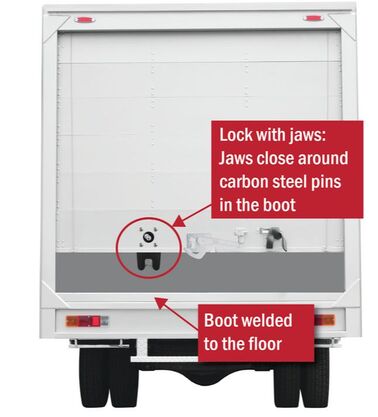 Roll Up Door Lock Roll Up Door Lock Thieves do take advantage when they see an opportunity to quickly steal or pilferage a trailer though. Pilferage is when part of a shipment, rather than the entire shipment, is stolen. Cargo thieves have learned that breaking into a parked trailer and removing some goods is less risky than stealing the entire trailer. Often times pilferage is difficult to detect quickly, putting time and space between the thief and the crime. While this is viewed as low risk to the thief, trucking companies are faced with economic loss from the stolen products, insurance claims and damaged customer relationships. Pilferage can happen to a delivery truck during a busy delivery schedule. A driver may skip locking a padlock and hasp system when they go inside to make a delivery, resulting in unlocked doors. The ENFORCER Roll Up Door Lock is a heavy duty solution to this threat. The Roll Up Door Lock automatically locks when the box truck is closed. Often times this lock is referred to as a “slam lock”. When the door is closed, the interior jaws spring open to close around the carbon steel pins in the base that is welded to the floor. 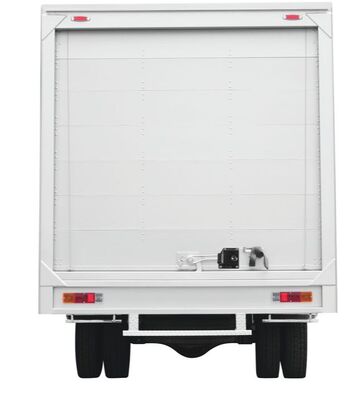 Trailer Lock Box Trailer Lock Box Another security option for roll up doors that locks automatically is the ENFORCER® Trailer Lock Box #8055 which is permanently installed on the trailer door. The Lock Box replaces the standard trailer latch. The end of the trailer handle is inserted in the latching lock on the #8055. Lock is spring loaded to automatically lock when the handle goes into the lock mechanism. Provides protection without the hassle of having to put on and take off a padlock at multiple stops. Both ENFORCER locks include a high security ABLOY® lock cylinder that can be keyed individually or to a master system. Myth: Only high value freight is targeted for theft. All types of freight can be a target of theft or pilferage. Sometimes thieves don’t know what is in a trailer before stealing it. Criminals will steal anything they believe they can sell and almost all goods are fair game. Currently electronics are the most targeted items; theft of electronics is up 34% year-over-year according to CargoNet’s 2021 Supply Chain Risk Trends Analysis. Food is often targeted because it is easy to sell and the evidence is consumed. Fleets can be targeted because they aren’t utilizing high security locks. Companies should lock equipment and cargo with heavy duty locking devices. Invest in security devices that will deter criminals such as the ENFORCER Adjustable Rear Door Lock which includes an ABLOY padlock or utilize a hasp and padlock assembly. The ENFORCER King Pin Locks are heavy duty and secure dropped trailers and containers from theft while parked at terminals, distribution centers or retail stores. The King Pin includes an ABLOY lock cylinder. Myth: Cargo theft only occurs in large cities. While it is true that a large amount of cargo theft happens in large cities such as Los Angeles, Miami and Toronto; a growing amount of cargo theft is happening in rural areas. Rural areas are seeing an increase in theft because thieves have learned that local police departments are unable to provide much assistance. Agricultural cargo theft has increased in the past few years as well. Equipment and food items, such as nuts, have been targeted coming out of rural communities. Additionally, smaller ports are now seeing an increase in theft due to port logjams and higher amounts of cargo moving through. Myth: Seal tampering is a cost of doing business. Unauthorized seal tampering can be frustrating and expensive. Many types of seals are easy to compromise and trucking companies have to write-off expenses due to these instances. Receivers may reject a load due to seal compromise, costing shipper’s money and risking customer relationships. Fleets have an option to prevent seal issues. We recommend the ENFORCER Seal Guard Lock, a locking device that is permanently installed on the trailer and closes over the seal to protect the integrity of the load. The Seal Guard is available with a heavy duty ABLOY padlock. Cargo theft continues to adapt, so we need to remain vigilant. Keep yourself and staff informed of industry trends and continue to be proactive in securing your equipment and cargo.
By Nick Erdmann Over the past few months supply chain delays, bottlenecks and cargo thefts have made national news on a more frequent basis. Consumers are learning two things that most of those in the industry already know:
Now more than ever, manufacturers and their shippers must be proactive about preventing cargo theft. Companies can experience a variety of delivery obstacles. Retailers and manufacturers rely on shipping companies to deliver on time but mechanical issues with the truck, driver service hour requirements or improperly packed shipments can ultimately mean product is missing on the shelf. Out-of-stocks can be very costly and customer satisfaction may be impacted. Don’t add trailer theft or pilferage to the list of reasons why your products may not be delivered. When evaluating risk-mitigation, select a shipper that prioritizes security. It is common practice for manufacturers to require a certain level of security on their loads. Companies can set these security standards, including requiring a high security padlock, trailer door lock or seal protection for cargo in transit. Cargo at rest in storage containers or parked trailers may also require heavy duty king pin locks. In CargoNet’s 2020 Supply Chain Risk Report, “Reports of cargo only theft incidents increased by 18% year-over-year - this category would consist of trailer pilferage events, fictitious pickups, and warehouse burglaries.” Data from CargoNet’s report also shows locations that experienced the highest amount of theft for the year were truck stops, parking lots and warehouses/D.C.’s. These locations can be particularly vulnerable for retailers with products sitting in trailers. The ENFORCER® security products for trucks, trailers and containers are designed for the rugged supply chain environment. The ENFORCER products include ABLOY® heavy duty padlocks and security devices that incorporate ABLOY lock cylinders or padlocks. ABLOY locks allow for various master keying systems. An excellent lock for retail applications is the ENFORCER Adjustable Lock #1217. This lock is portable and ready to use right out of the box. No installation is necessary. The Adjustable has a cast steel block that protects an ABLOY 350 padlock (included with purchase) for maximum security from physical attack and rear door tampering. The lock adjusts in half inch increments around the locking rods making for a tight fit on all trailers and containers. It protects both the active and passive swing doors. If your company is utilizing seals on containers, you may want to require The ENFORCER® Trailer Seal Guard™ Lock. The Seal Guard lock is permanently installed on the trailer door securing plastic, metal, bolt or cable seals from tampering and unauthorized removal. The lock goes over the seal and is secured with an ABLOY® padlock protecting both the seal and the trailer door. For dropped trailers, consider requiring shippers to use a heavy duty king pin lock such as the ENFORCER King Pin Lock. This lock is portable and easy to install. The lock is made of solid cast steel alloy. It covers and locks the king pin to prevent unauthorized trailer hook ups. Retailers are encouraged to evaluate security standards for shipping companies and consider requiring heavy duty locks to secure product. This will help mitigate theft and disruptions to your supply chain.
|
Categories
All
Archives
February 2024
|
©2024 Transport Security, Inc. 820 South Pine Street Waconia, MN 55387 952-442-5625 enforcer@transportsecurity.com


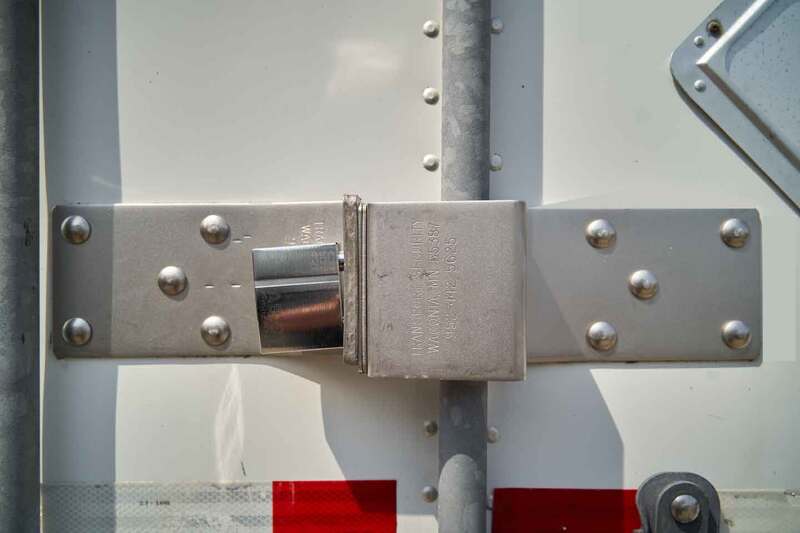
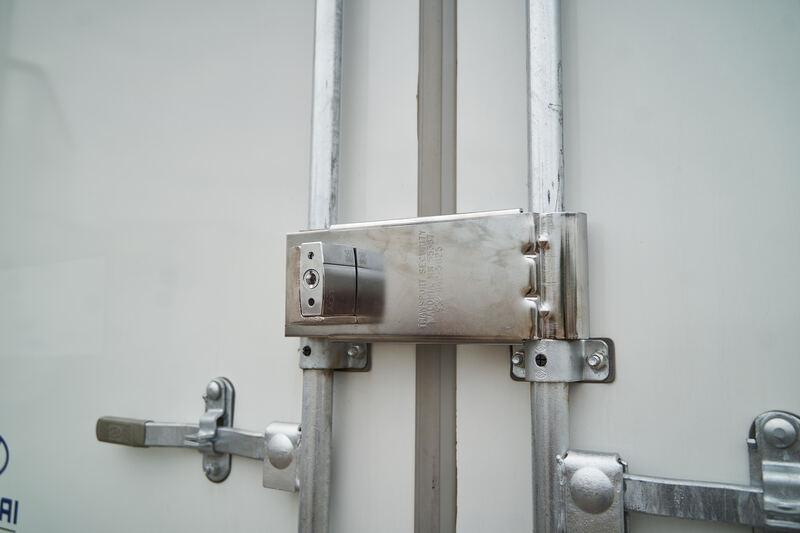
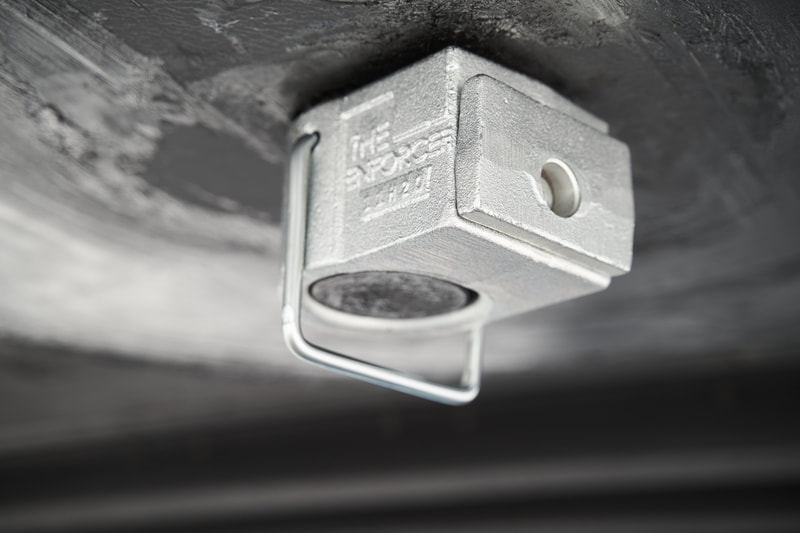
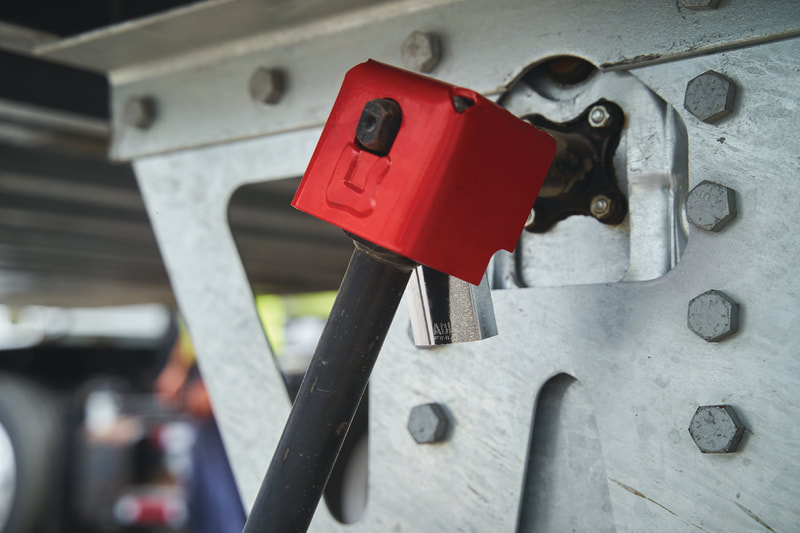
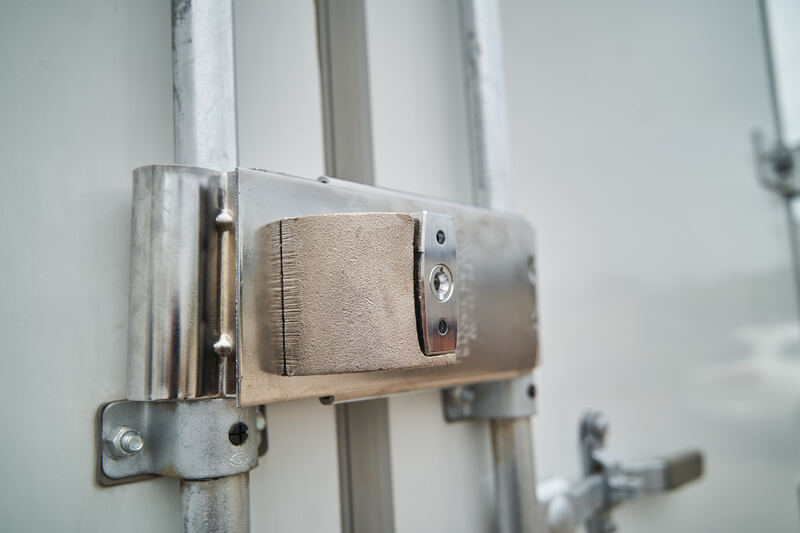
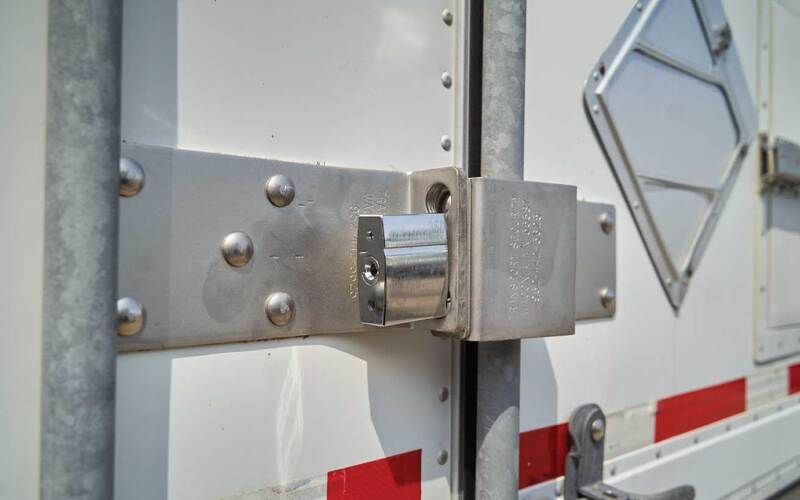
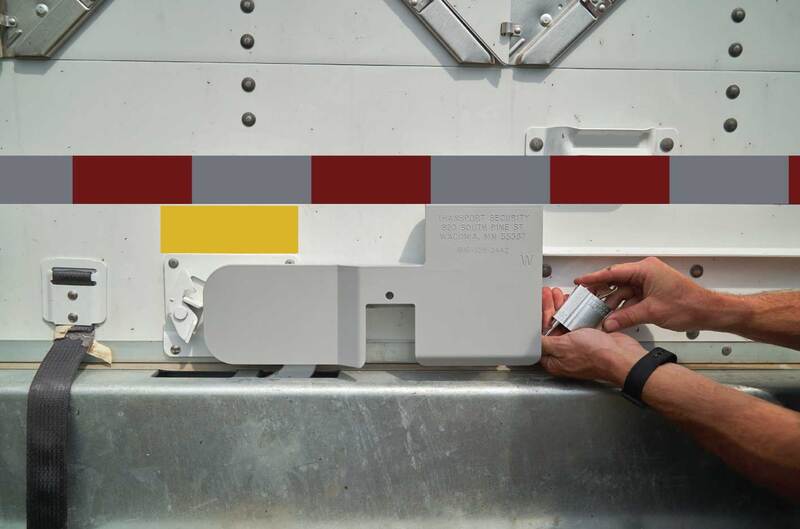
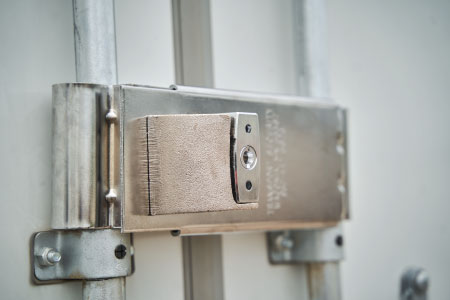
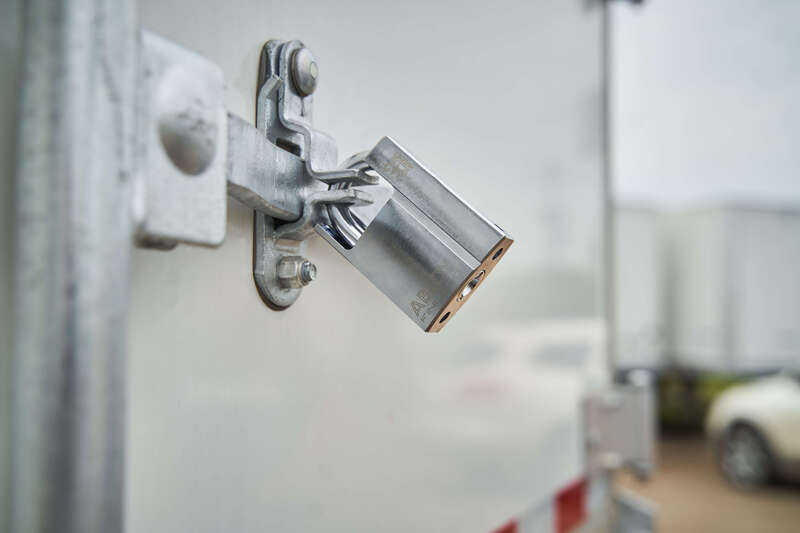
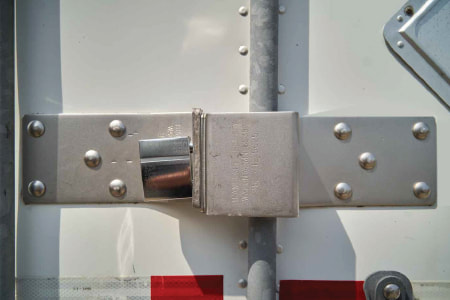
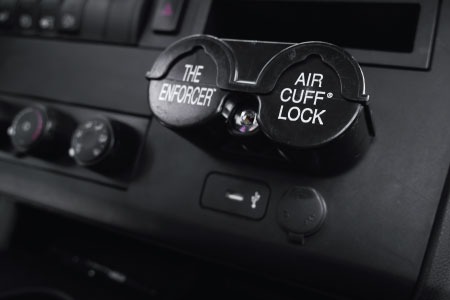
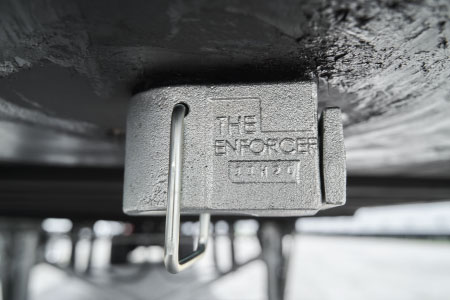
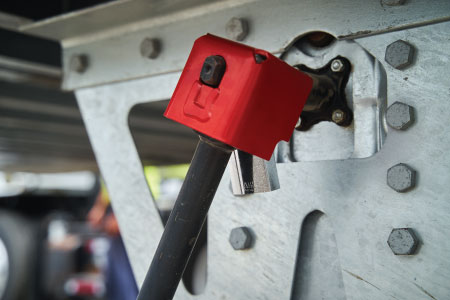

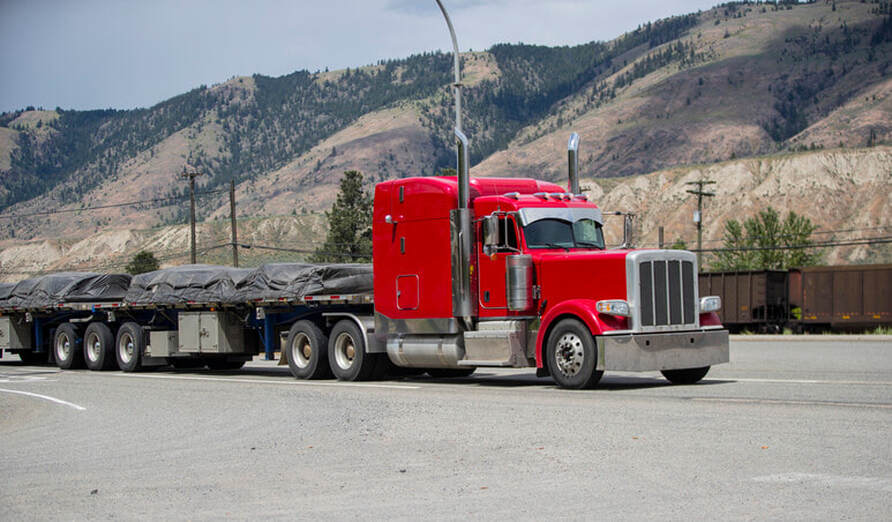
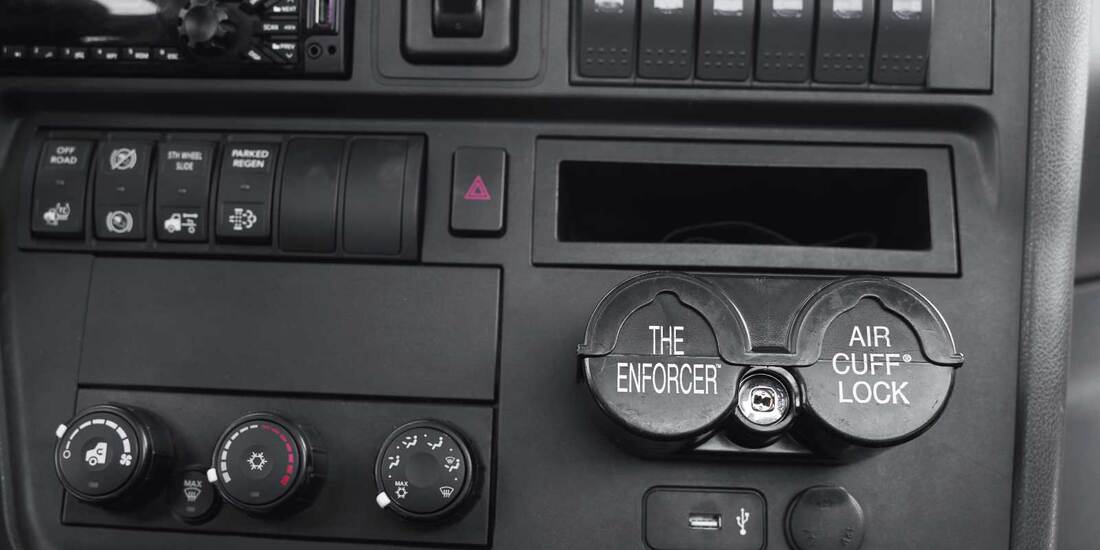
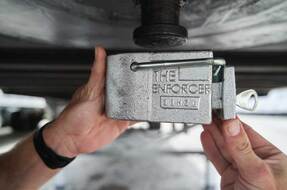
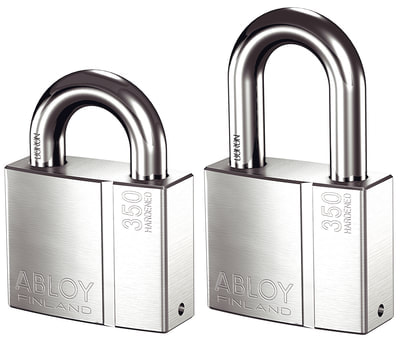
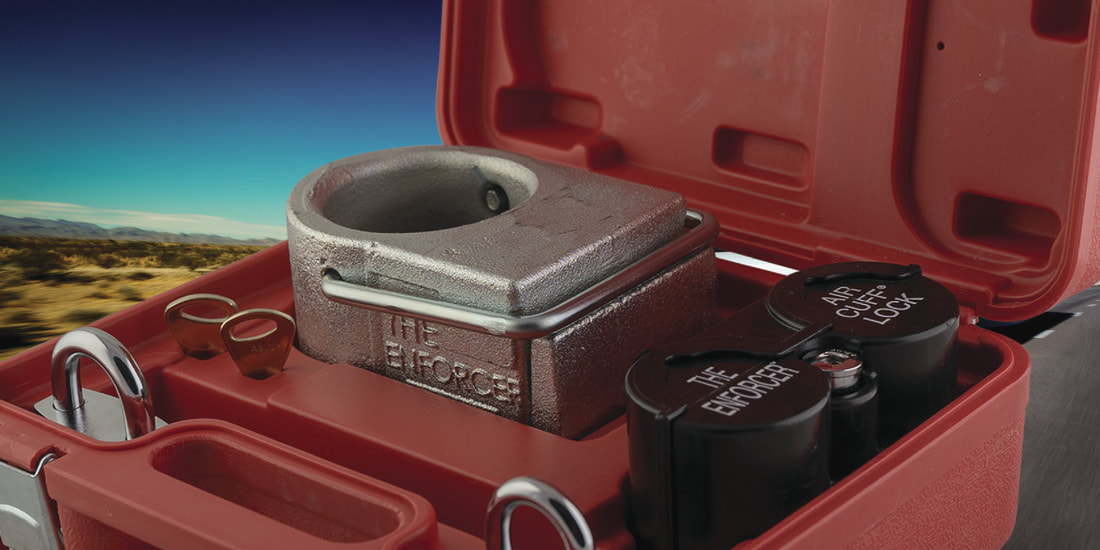

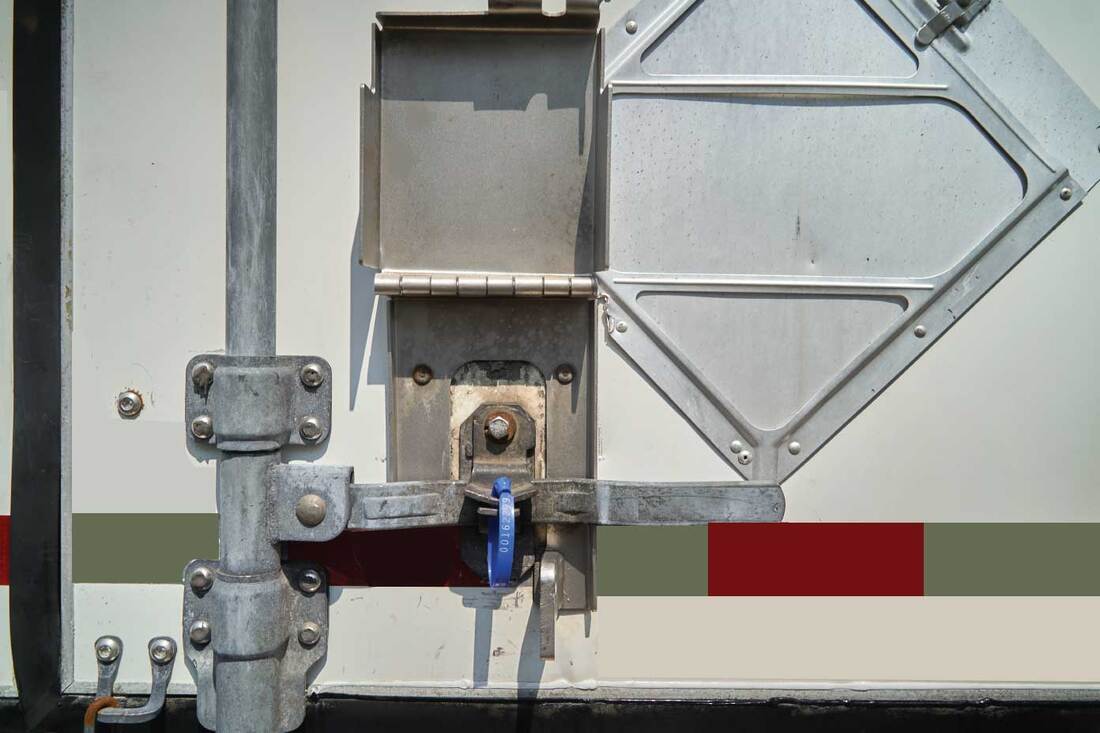
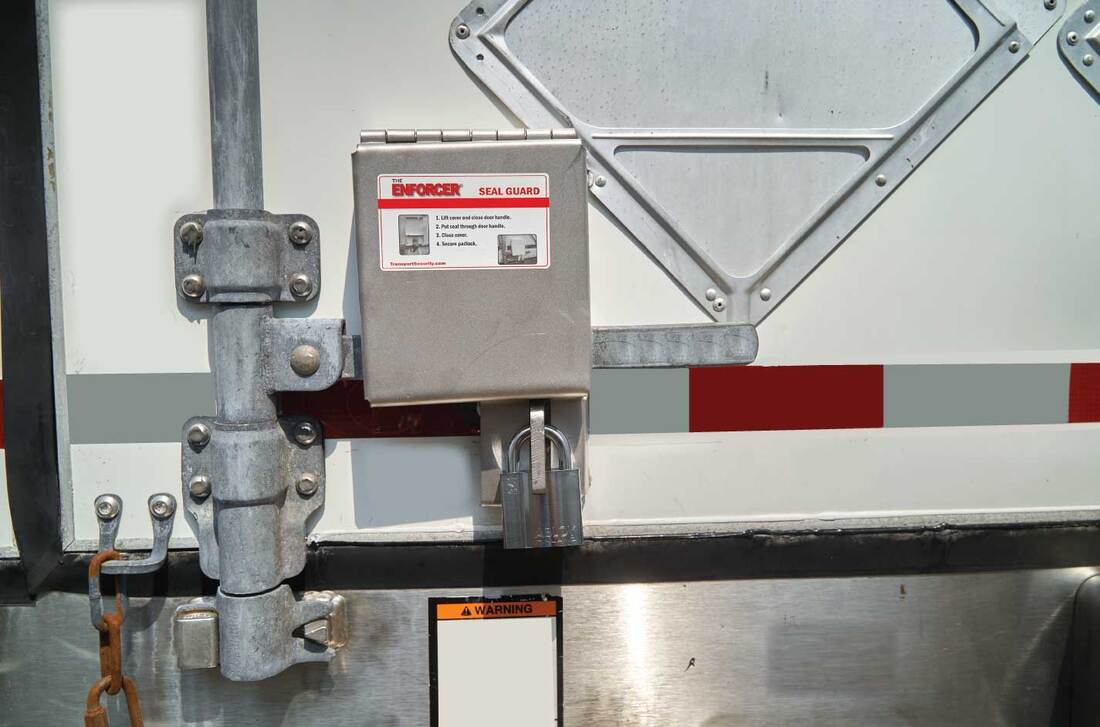
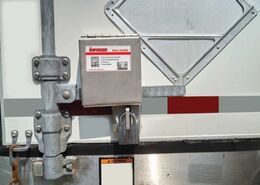
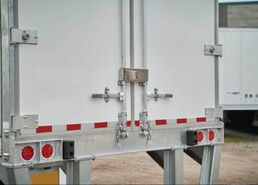
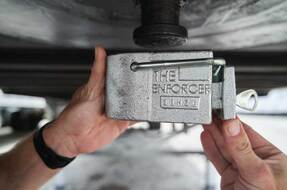
 RSS Feed
RSS Feed